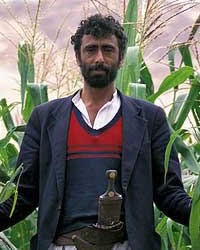Arab, Hadrami in Kenya

Photo Source:
Tribes of the World - Flickr
Creative Commons
|
Send Joshua Project a map of this people group.
|
| People Name: | Arab, Hadrami |
| Country: | Kenya |
| 10/40 Window: | No |
| Population: | 14,000 |
| World Population: | 6,063,000 |
| Primary Language: | Arabic, Hadrami |
| Primary Religion: | Islam |
| Christian Adherents: | 0.00 % |
| Evangelicals: | 0.00 % |
| Scripture: | Portions |
| Ministry Resources: | Yes |
| Jesus Film: | No |
| Audio Recordings: | Yes |
| People Cluster: | Arab, Yemeni |
| Affinity Bloc: | Arab World |
| Progress Level: |
|
Introduction / History
Though most of the Muslim peoples of the Arabian Peninsula speak Arabic and have similar ancestry and dress, they are not all one people. Among the two million inhabitants of Hadhramaut, there are 1,300 distinct Arab tribes, collectively called the Hadrami. There is very little unity among them in Yemen, and also in Kenya, where they have a much smaller population.
What Are Their Lives Like?
Antagonism between Hadrami townsfolk and wandering tribesmen has been so bitter that the towns are surrounded by stone walls to protect them from attack by their tribal countrymen. Today approximately half of the Hadramis live in the towns and villages scattered through the deep valleys of their region. Even among these settled peoples, there are sharp distinctions, the highest social prestige belonging to the wealthy, educated Sadahs, who claim to be direct descendants of Mohammed. Hadramis rarely marry outside their own social level, and often live in segregated groups in separate parts of town. There is no national church for any of the people groups in southern Yemen.
What Are Their Beliefs?
Hadrami Arabs are Sunni Muslims who believe that the Supreme God, Allah, spoke through his prophet, Mohammed, and taught mankind how to live a righteous life through the Koran and the Hadith. To live a righteous life, you must utter the Shahada (a statement of faith), pray five times a day facing Mecca, fast from sunup to sundown during the month of Ramadan, give alms to the poor, and make a pilgrimage to Mecca if you have the means. Muslims are prohibited from drinking alcohol, eating pork, gambling, stealing, slandering, and making idols. They gather for corporate prayer on Friday afternoons at a mosque, their place of worship. The two main holidays for Sunni Muslims are Eid al Fitr, the breaking of the monthly fast and Eid al Adha, the celebration of Abraham's willingness to sacrifice his son to Allah. Sunni religious practices are staid and simple. They believe that Allah has pre-determined our fates; they minimize free will. In most of the Muslim world, people depend on the spirit world for their daily needs since they regard Allah as too distant. Allah may determine their eternal salvation, but the spirits determine how well we live in our daily lives. For that reason, they must appease the spirits. They often use charms and amulets to help them with spiritual forces.
What Are Their Needs?
Hadrami Arabs in Kenya need someone to take Christ to them so they can experience life to the full (John 10:10). Kenya has thousands of vibrant Christ followers who can do that.
Prayer Points
Pray for spiritual discernment and hunger among the Hadrami Arabs in Kenya. Pray for workers who are driven by the love and boldness of the Holy Spirit to go to them. Pray that the Garre Hadrami people will have a spiritual hunger that will open their hearts to the King of kings. Pray for a movement to Christ among them to begin this decade.